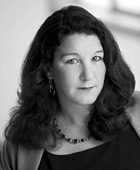A transplanted Bostonian, Susan Rich is the winner of the PEN USA Poetry Award as well as the Peace Corps Writers Poetry Award for The Cartographer’s Tongue: Poems of the World, (White Pine Press, 2000). Her new book, Cures include Travel is forthcoming from White Pine Press.
She has worked as a staff person for Amnesty International, an electoral supervisor in Bosnia, and a human rights trainer in Gaza. Rich lived in the Republic of Niger, West Africa as a Peace Corps Volunteer, later moving to South Africa to teach at the University of Cape Town on a Fulbright Fellowship.
Rich’s international awards include invitations from the USIS to work in Zimbabwe as a writer-in-residence, a residency at the Tyrone Guthrie Center in Ireland, and a Ruben Rose Award from Israel. Other poetry honors include an Artist Trust Fellowship from Washington State, the Rella Lossy Award from the San Francisco State Poetry Center, the Sojourner Poetry Award chosen by June Jordan, the Glimmer Train Poetry Award, and the William Stafford Award.
Her poems have appeared in journals both in the United States and internationally including the Christian Science Monitor, DoubleTake, Harvard Magazine, Massachusetts Review, Mercator’s World, New Contrast – South Africa, Poet Lore, Prism International, Southern Poetry Review and Witness. Anthologized poems, essays, and interviews are included in Best Essays of the Northwest, O Taste and See: Food Poems, South African Poets on Poetry 1992-2001, Literary Lunch, To Touch the World: the Peace Corps Experience, and Voices From the Field: Peace Corps Worldwise Schools.
Educated at the University of Massachusetts, Harvard University, and the University of Oregon, Susan Rich lives in Seattle and teaches at Highline Community College and the Antioch University MFA Program in Los Angeles. She is an active member of the Somali Rights Network, a non-governmental organization, an alum of Cottages at Hedgebrook, and an editor at Floating Bridge Press.
Statement
Someday I’ll write a travel piece on the places I’ve slept or tried to sleep while on the road but who will believe it? A hotel under gunfire in Croatia, a whorehouse in Mopti, one haunted Edinburgh flat. As much as these nights are emblazoned in my memory, they are not the reason I keep answering the allure of travel still whistling at my door.
Responding to this calling, opening this blue door, sends me somewhere more complex than these adventures imply. For me, the external journey of the traveler and the internal mapping of the poet are different sides of one central desire: the search for an extended worldview. Perhaps my poetry is a kind of distilled reflection of my travels, often written years after returning home. Almost a decade elapsed between when I completed my Peace Corps service and began the first poems of living in the Republic of Niger. I needed the passing of time in order to let go of the literal and move into a more internal mapping of my experience.
The act of mapping seems right to me in terms of exploration: the poet’s and the adventurer’s. The process is ongoing; the constant questioning of which road or line break to turn on and which one to privilege or revise altogether. The daily accidents that bring the poet, the traveler, into unexplored territory may offer new experiences that knock us off balance, literally and figuratively so that we no longer know who we are or where we stand. The poet-traveler rearranges the geological terrain with her own nomadic coordinates. Who could ask for more?
|






